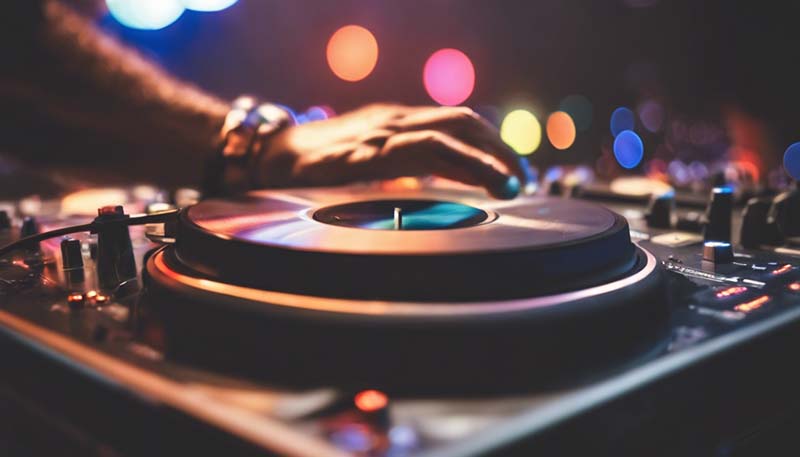The Role of the DJ in Modern Music
DJing, or disc jockeying, has become an integral part of modern music culture. The role of the DJ has evolved significantly over the years, transforming from a background figure to a central figure in the music industry. This article will explore the various roles and responsibilities of a DJ in today's music landscape, including their impact on music production, live performances, and the overall music experience.
1. Music Selection and Curation
The DJ's role in music selection and curation is crucial. They are responsible for creating the perfect atmosphere at events, clubs, and festivals by carefully choosing the right tracks to play. This requires a deep understanding of music genres, audience preferences, and the ability to read the crowd's energy. A good DJ can elevate the mood and create memorable experiences for the audience.
1.1 Genre Knowledge
DJs must have a comprehensive knowledge of various music genres, from electronic dance music (EDM) to hip-hop, pop, and beyond. This helps them to select tracks that resonate with different audiences and create a diverse and engaging playlist.
1.2 Audience Analysis
Understanding the audience is a vital skill for a DJ. They must be able to gauge the crowd's mood and preferences, adjusting their music selection accordingly. This can involve playing popular hits, deep cuts, or even their own remixes, depending on the audience's reaction.
1.3 Track Transitions
Smooth track transitions are a hallmark of a skilled DJ. They must seamlessly blend songs together, creating a continuous flow of music that keeps the audience engaged and moving. This requires a keen sense of timing, rhythm, and an ear for harmonic mixing.
2. Live Performance and Entertainment
DJs are not just selectors of music; they are also performers and entertainers. A live DJ set is a spectacle in itself, with DJs often incorporating various elements such as lighting, visuals, and stage presence to create a memorable show.
2.1 Mixing and Scratching
Mixing and scratching are essential skills for a DJ. Mixing involves blending tracks together in a way that is both musically and rhythmically coherent, while scratching is a technique used to create unique sounds and rhythms by manipulating the vinyl or digital tracks.
2.2 Audience Interaction

Engaging with the audience is a key aspect of a DJ's live performance. This can involve speaking to the crowd, responding to their energy, and even incorporating audience requests into the set. A good DJ can create a sense of connection and community among the audience members.
2.3 Visual Aesthetics
Visuals play a significant role in a DJ's live performance. DJs often work with visual artists or use pre-produced visuals to enhance the overall experience. This can include lighting effects, video projections, and even live camera feeds, all designed to complement the music and create a cohesive show.
3. Music Production and Remixing
Many DJs are also producers and remixers, creating their own music and reinterpreting the work of others. This adds another layer to their role in modern music, as they contribute to the creation of new tracks and reimagined versions of existing ones.
3.1 Original Production
Original music production allows DJs to express their unique artistic vision and contribute to the ever-evolving landscape of electronic music. This can involve creating tracks from scratch or collaborating with other musicians and producers.
3.2 Remixing
Remixing is a popular way for DJs to put their own spin on existing tracks. By reworking the original composition, they can introduce new elements, styles, and sounds, giving the track a fresh perspective and potentially reaching new audiences.
3.3 Collaboration
Collaboration is a common practice among DJs and producers. By working with other artists, they can combine their skills and ideas, resulting in unique and innovative music. Collaborations can also help DJs expand their reach and connect with different fan bases.
4. Influence on Music Trends and Culture
DJs have a significant influence on music trends and culture. As tastemakers and trendsetters, they can help to popularize new genres, artists, and sounds, shaping the direction of modern music.
4.1 Genre Popularization
DJs play a crucial role in popularizing new genres and sub-genres. By incorporating these sounds into their sets and playlists, they can introduce audiences to new music and help to establish these genres within the mainstream.
4.2 Artist Discovery
DJs often act as discoverers of new talent. By playing tracks from emerging artists in their sets, they can help to bring attention to these musicians and contribute to their success.
4.3 Cultural Impact
The influence of DJs extends beyond music itself. They can shape cultural trends and attitudes, particularly within youth and nightlife scenes. Through their performances, collaborations, and public personas, DJs can inspire and influence fashion, dance, and even social issues.
5. Conclusion
In conclusion, the role of the DJ in modern music is multifaceted and influential. From music selection and curation to live performances, music production, and cultural impact, DJs play a vital part in shaping the music landscape. As the music industry continues to evolve, the role of the DJ is likely to expand and adapt, remaining an essential figure in the world of music.